Die Flammen lügen (1926)

German postcard by Ross Verlag, no. 59/1. Photo: Henny Porten-Froehlich Produktion. Henny Porten and Ferdinand von Alten in Die Flammen lügen/The flames lie (Carl Froehlich, 1926).

German postcard by Ross Verlag, no. 59/2. Photo: Henny Porten-Froehlich Produktion. Henny Porten in Die Flammen lügen/The flames lie (Carl Froehlich, 1926). The men may be Paul Bildt and Gerd Briese as Porten's father and brother in the film.
Die Flammen lügen/The flames lie (Carl Froehlich, 1926) is a German silent melodrama, written by Friedrich Raff. Henny Porten played the lead role as Gertrud von Gehr. Gertrud is the daughter of the retired officer Major von Gehr (Paul Bildt), who is annoyed by the new house of his neighbour, the wealthy factory owner Conrad Birkinger (Hans Adalbert Schlettow).
To make matters worse, Gehr's daughter Gertrud falls in love with Birkinger, and one day they get married. Their childless marriage is not a happy one. Birkinger cheats on his wife with his former girlfriend Doritt Lenee (Ruth Weyher). The unfaithful husband even goes so far that he and Doritt rent a room in a hotel as Mr. and Mrs. Birkinger.
When a fire breaks out in the hotel, the two can not escape and perish in the flames. Now Gertrud Birkinger is officially dead. At first, she does not notice anything about this development, because she too stayed in the hotel because she had secretly travelled to join her husband. But she could be saved.
After a lengthy recovery, Gertrud returns to her old, premarital life and devotes herself entirely to her brother Hermann's (Gerd Briese) children.
Die Flammen Lügen was shot in April and May 1926 in the Berlin-Staaken studio. The film passed the censorship on September 25th and was banned from youth. The premiere took place on 22 October 22nd, 1926 in the Berlin movie palace Mozartsaal. Franz Schroedter was responsible for the film sets, Axel Graatkjær was the director of photography, and Walter Supper the editor.
Paimann’s Filmlisten reviewed: “The subject is kept quite sentimental and has a number of gripping moments. The direction is steady, the presentation and photography smooth.

German postcard by Ross Verlag, no. 59/3. Photo: Henny Porten-Froehlich Produktion. Henny Porten and Hans Adalbert Schlettow in Die Flammen lügen/The flames lie (Carl Froehlich, 1926).

German postcard by Ross Verlag, no. 59/4. Photo: Henny Porten-Froehlich Produktion. Henny Porten in Die Flammen lügen (Carl Froehlich, 1926).
Liebe im Kuhstall (1928)
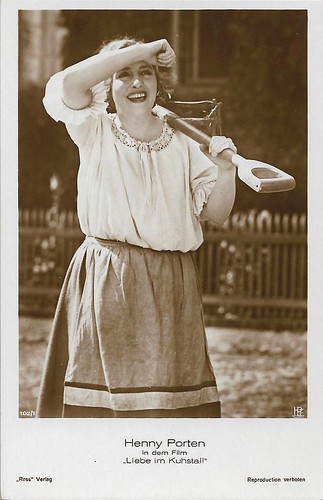
German postcard by Ross Verlag, no. 102/1. Photo: Henny Porten Freuhlich-Produktion. Henny Porten in Liebe im Kuhstall/Love in the Cowshed (Carl Froelich, 1928).
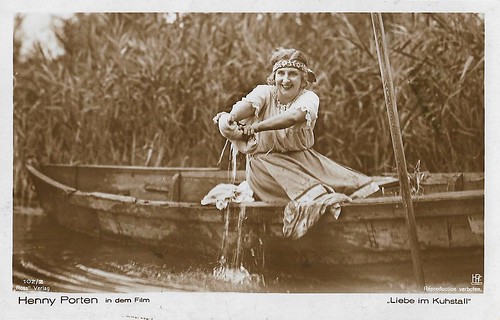
German postcard by Ross Verlag, no. 102/2. Photo: Henny Porten Freuhlich-Produktion. Henny Porten in Liebe im Kuhstall/Love in the Cowshed (Carl Froelich, 1928).
In Liebe im Kuhstall/Love in the Cowshed (Carl Froelich, 1928), Janos von Holodronz (Iwan Kowal-Samborski) is a real good-for-nothing from old nobility. Together with his four friends, he lives in a completely dilapidated estate. Now, according to his uncle Albrecht (Eugen Neufeld), only marrying a wealthy lady can save his economic survival. He believes that the wealthy Countess Koritowska would be an ideal marriage candidate. But Janos stands across, he doesn't want to. At least not this unknown woman, because he (and his four cronies as well) has long since lost his heart to the perky cowgirl Marischka (Henny Porten).
One day she appeared out of nowhere, or better said: she was discovered in the hay. That is where the young woman had laid down to rest the night before when she was surprised by a downpour on her wandering after work in the cowshed. The five men don't think twice: of course, this Marischka finds work with them straight away. The buxom cowgirl immediately notices that she is turning the heads of the men on the farm and makes full use of this. The peasant girl, who doesn't seem to have much experience in her job, soon messes up the entire estate.
One day Janos' uncle Albrecht, Knight of Holodronz, appears and frankly offers his nephew money if he should finally lead a distinguished young lady from a good (and above all wealthy) home to the altar. His four friends then have a "brilliant" idea. Why not just make Marischka "elegant" and sell it to the wealthy uncle as a "good match". Said and done. But soon all this becomes too stupid for Marischka. She confesses the truth to her uncle and runs away crying. The five men's beautiful plan seems to have failed, and Janos would like to tie himself up with a rope straight away. But the stupid cowgirl stole it and used it to tie her bundle, as she left the yard at once.
The crybaby, disappointed by Janos, explains that she will bring the rope back at Pentecost when the merchant of the place where Janos is heavily in debt has taken over the farm and moved into it. Janos should have been chased from the farm by then. How can the latter suspect that this whole story was only staged by Countess Koritowska, who in truth is identical to Marischka and of course also not a cowgirl, in order to test Janos as a possible marriage candidate? In the end, after all the trials and tribulations, the lovers still find each other.
Other actors in Liebe im Kuhstall/Love in the Cowshed (Carl Froelich, 1928) were Oskar Karlweis as Oberleutnant a. D. Wedelski, Otto Wallburg as Wenzel the soap cutter, and - debuting on screen - Felix Bressart as bailiff. Fritz Friedmann-Frederich and Walter Supper scripted the film. Sets were by Gustav A. Knauer and Willy Schiller, cinematography by Gustave Preiss. Porten's husband Wilhelm Kauffmann co-produced the film and was production manager too. The film premiered 26 October 1928 at the Berlin cinema Capitol.

German postcard by Ross Verlag, no. 102/3. Photo: Henny Porten Freuhlich-Produktion. Henny Porten in Liebe im Kuhstall/Love in the Cowshed (Carl Froelich, 1928).
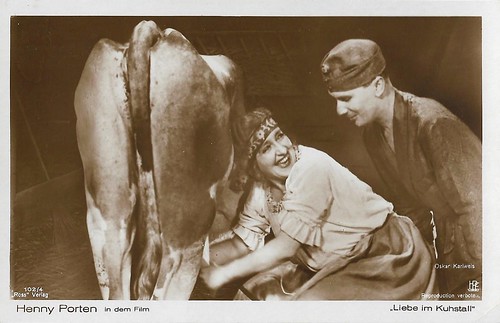
German postcard by Ross Verlag, no. 102/4. Photo: Henny Porten Freuhlich-Produktion. Henny Porten and Oskar Karlweiss in Liebe im Kuhstall/Love in the Cowshed (Carl Froelich, 1928).

German postcard by Ross Verlag, no. 102/5. Photo: Henny Porten Freuhlich-Produktion. Henny Porten and Otto Wallburg in Liebe im Kuhstall/Love in the Cowshed (Carl Froelich, 1928).
Skandal um Eva (1930)

German postcard by Ross Verlag, no. 122/1. Photo: Schmoll / Henny Porten Freuhlich-Produktion. Henny Porten in Skandal um Eva/Scandalous Eva (Georg Wilhelm Pabst, 1930).
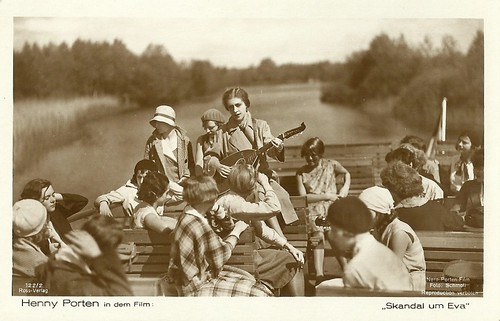
German postcard by Ross Verlag, no. 122/2. Photo: Schmoll / Nero-Porten-Film. Henny Porten in Skandal um Eva/Scandalous Eva (Georg Wilhelm Pabst, 1930).
In Skandal um Eva/Scandalous Eva (Georg Wilhelm Pabst, 1930), Eva Rüttgers (Henny Porten) is a young teacher in a German provincial town. She becomes engaged to the educator Dr. Kurt Hiller (Oskar Sima). By chance, she learns of a four-year-old Hiller's illegitimate son. She secretly drives to the foster parents of little Gustav and returns with him to town.
What was actually planned as a surprise for her fiancé turned into a moral scandal. Hiller does not recognise his own son and, like the rest of the city, considers him to be Eva's illegitimate son, who has deliberately kept this son a secret and now wants to bring him into the marriage.
Eva is supposed to be fired from her position as a teacher. This gets the students involved. They do not want to be separated from the popular teacher and this leads to the clarification of the misunderstanding with their protests.
Skandal um Eva/Scandalous Eva (Georg Wilhelm Pabst, 1930) was based on the popular stage farce 'Skandal um Olly' by Heinrich Ilgenstein. It was both Porten and G.W. Pabst's first sound film. It was considered an entertaining film that showed the mastery of Porten.
Skandal um Eva/Scandalous Eva (Georg Wilhelm Pabst, 1930) was scripted by Friedrich Raff and Julius Urgiß, the cinematography was by Fritz Arno Wagner, and editing by Wolfgang Loë-Bagier and Marc Sorkin. The film premiered in Germany on 11 June 1930.

German postcard by Ross Verlag, no. 122/3. Photo: Schmoll / Nero-Porten-Film. Henny Porten and Oskar Sima in Skandal um Eva/Scandalous Eva (Georg Wilhelm Pabst, 1930).
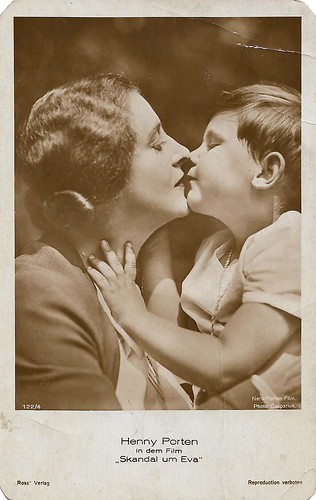
German postcard by Ross Verlag, no. 122/4. Photo: Schmoll / Nero-Porten-Film. Henny Porten in Skandal um Eva/Scandalous Eva (Georg Wilhelm Pabst, 1930).
Sources: Wikipedia (German) and IMDb.
No comments:
Post a Comment